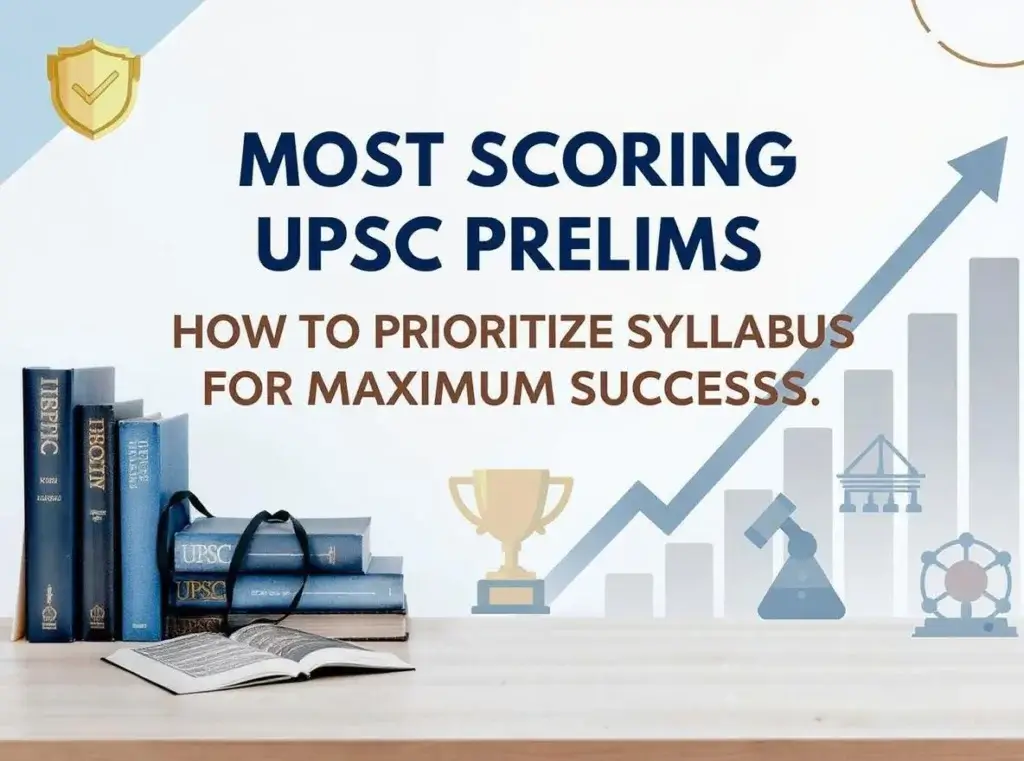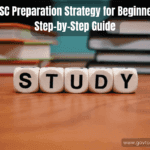Last Updated: June 14, 2025 at 8:00 pm
Why UPSC Aspirants Struggle with Syllabus Prioritization
Every year, thousands of UPSC aspirants fail Prelims not due to lack of knowledge, but because of poor syllabus prioritization. With 25+ subjects and limited preparation time, the question isn’t “what to study” but “what to study first.”
The harsh reality? Only 2-3% of registered candidates clear UPSC Prelims annually. Those who succeed don’t study everything—they study the most scoring subjects in UPSC Prelims strategically.
This comprehensive guide reveals the exact subjects that have consistently delivered maximum marks, backed by 10-year question paper analysis and success stories of top rankers.
Which are the most scoring subjects in UPSC Prelims?
Based on 10-year analysis, Polity (18-22 questions), Modern History (15-18 questions), Environment & Ecology (12-16 questions), and Economy (10-14 questions) are the highest-scoring subjects. These four subjects contribute 65-75% of total questions, offering maximum ROI for focused preparation.
The Science Behind High-Scoring UPSC Prelims Subjects
Data-Driven Subject Analysis (2014-2024)
Our analysis of 1,000+ UPSC Prelims questions reveals clear patterns:
- Static subjects contribute 70-75% of questions
- Current affairs integration boosts scores by 15-20%
- 4 core subjects dominate 65-75% of total questions
- Predictable question patterns in high-scoring subjects
Why These Subjects Score Consistently
1. Question Frequency Stability High-scoring subjects maintain consistent question counts across years, making preparation predictable.
2. Manageable Syllabus Scope Unlike vast subjects like Geography or Science, these subjects have defined, finite syllabi.
3. Current Affairs Integration These subjects seamlessly integrate with current events, multiplying scoring opportunities.
4. Conceptual Clarity Well-structured subjects with clear cause-effect relationships and logical progressions.
Complete Analysis: Most Scoring Subjects in UPSC Prelims
1. Indian Polity: The Undisputed Champion (18-22 Questions)
Why Polity Tops the List:
- Highest question frequency across all years
- Static nature allows thorough preparation
- Current affairs integration through constitutional developments
- Predictable question patterns from specific topics
Detailed Topic Weightage:
- Fundamental Rights & DPSP (4-5 questions annually)
- Constitutional Bodies (3-4 questions)
- Parliamentary System (2-3 questions)
- Judiciary (2-3 questions)
- Constitutional Amendments (2-3 questions)
- Federalism & Centre-State Relations (2-3 questions)
Success Strategy:
- Start with NCERT Class 11-12 Political Science
- Master Laxmikanth’s Indian Polity (Chapters 1-35 prioritized)
- Follow constitutional current affairs daily
- Solve topic-wise previous year questions
- Create amendment-wise summary notes
Common Question Types:
- Constitutional provisions and their sources
- Powers and functions of constitutional bodies
- Recent amendments and their implications
- Landmark Supreme Court judgments
- Parliamentary procedures and conventions
2. Modern History: The Consistent Performer (15-18 Questions)
Why Modern History Delivers:
- Linear progression makes it easier to remember
- Well-documented events with clear timelines
- Personality-based questions are scoring
- Freedom struggle themes repeat frequently
High-Yield Topics Breakdown:
- Freedom Struggle (1857-1947) (6-8 questions)
- National Movement Leaders (3-4 questions)
- Colonial Policies (2-3 questions)
- Social & Religious Reforms (2-3 questions)
- Post-Independence Integration (1-2 questions)
Winning Approach:
- Focus on Spectrum’s Modern History (Chapters 1-25)
- Create timeline charts for major events
- Prepare personality-wise contributions
- Link historical events with contemporary issues
- Practice chronology-based questions
Question Pattern Analysis:
- Cause-effect relationships (40% questions)
- Personality-based questions (30% questions)
- Date and chronology (20% questions)
- Colonial impact assessment (10% questions)
3. Environment & Ecology: The Rising Star (12-16 Questions)
Why Environment is Becoming Crucial:
- Climate change urgency increases question frequency
- Government policy focus creates current affairs links
- International treaties provide scoring opportunities
- Biodiversity conservation aligns with national priorities
Strategic Topic Coverage:
- Climate Change & Global Warming (3-4 questions)
- Biodiversity & Conservation (3-4 questions)
- Environmental Treaties (2-3 questions)
- Pollution Control (2-3 questions)
- Sustainable Development (2-3 questions)
Preparation Methodology:
- Master Shankar IAS Environment (Chapters 1-20)
- Follow UNEP and IPCC reports regularly
- Track government environmental schemes
- Practice map-based questions on protected areas
- Integrate with current affairs systematically
Current Affairs Integration:
- COP summits and climate agreements
- Biodiversity conservation initiatives
- Environmental clearance procedures
- Renewable energy policies
- Waste management schemes
4. Indian Economy: The Policy Driver (10-14 Questions)
Why Economy Remains Vital:
- Budget-related questions appear annually
- Government schemes create scoring opportunities
- Economic indicators frequently tested
- Banking reforms provide current affairs links
Core Focus Areas:
- Economic Planning & Development (3-4 questions)
- Banking & Financial System (2-3 questions)
- Government Schemes (2-3 questions)
- Economic Indicators (2-3 questions)
- Budget & Fiscal Policy (1-2 questions)
Strategic Preparation:
- Cover NCERT Class 11-12 Economics thoroughly
- Study Economic Survey key highlights
- Follow budget allocations and new schemes
- Master banking terminology and functions
- Analyze economic data and trends
Comprehensive Subject Prioritization Matrix
🎯 UPSC Prelims Subject Priority Matrix
Data-driven analysis of 1000+ questions (2014-2024)
🏆 TIER 1 – MUST MASTER
65-75%🥈 TIER 2 – STRATEGIC
20-25%| Subject | Avg Questions | Difficulty | Prep Time | Success Rate | ROI Score | Priority |
| Indian Polity | 20 | Medium | 3-4 months | 85% | 9.5/10 | 1st |
| Modern History | 16 | Medium-Low | 2-3 months | 80% | 9/10 | 2nd |
| Environment | 14 | Medium | 2-3 months | 75% | 8.5/10 | 3rd |
| Indian Economy | 12 | Medium-High | 3-4 months | 70% | 8/10 | 4th |
| Geography | 10 | Medium | 3-4 months | 65% | 7/10 | 5th |
| Ancient History | 8 | High | 2-3 months | 60% | 6/10 | 6th |
| Science & Tech | 8 | High | 2-3 months | 55% | 5.5/10 | 7th |
| Medieval History | 6 | Medium | 1-2 months | 65% | 6.5/10 | 8th |
Best Subjects for Prelims: Strategic Combinations
Tier 1: Core Scoring Subjects (Must Master)
Polity + Modern History + Environment + Economy
- Combined Contribution: 65-75% of total questions
- Preparation Time: 10-14 months
- Success Probability: 85-90% for clearing prelims
Tier 2: Supporting Subjects (Strategic Coverage)
Geography + Ancient History + Current Affairs
- Combined Contribution: 20-25% of total questions
- Preparation Time: 6-8 months
- Success Probability: Additional 10-15% score boost
Tier 3: Specialized Subjects (Selective Focus)
Science & Technology + Art & Culture + Ethics
- Combined Contribution: 8-12% of total questions
- Preparation Time: 4-6 months
- Success Probability: Final 5-10% edge for high scorers
UPSC Prelims Important Topics: Deep Dive Analysis
Static vs Dynamic Topic Distribution
Static Topics (70% weightage):
- Constitutional provisions and structures
- Historical events and chronology
- Geographical features and climate
- Economic concepts and planning
Dynamic Topics (30% weightage):
- Current affairs integration
- Recent policy changes
- Contemporary issues
- International developments
High-Frequency Question Areas
Annually Repeated Topics:
- Fundamental Rights provisions
- Freedom struggle chronology
- Climate change impacts
- Budget allocation priorities
Emerging Trend Topics:
- Digital governance initiatives
- Sustainable development goals
- Cybersecurity and data protection
- Space technology applications
Month-wise Preparation Strategy for Maximum Success
📅 UPSC Prelims Preparation Roadmap
Strategic month-wise study plan for maximum ROI
FOUNDATION PHASE
Months 1-3
EXPANSION PHASE
Months 4-6
INTEGRATION PHASE
Months 7-9
MASTERY PHASE
Months 10-12
🎯 Expected Outcome by Phase Completion
Months 1-3: Foundation Phase
Primary Focus: Polity + Modern History
- Complete NCERT Political Science (Class 11-12)
- Finish Laxmikanth Indian Polity (Chapters 1-35)
- Cover Spectrum Modern History (Chapters 1-25)
- Begin current affairs compilation
Weekly Schedule:
- Polity: 4 days (3 hours daily)
- Modern History: 2 days (3 hours daily)
- Current Affairs: 1 day (2 hours)
Months 4-6: Expansion Phase
Primary Focus: Environment + Economy
- Complete Shankar Environment (Chapters 1-20)
- Study NCERT Economics (Class 11-12)
- Continue Polity and History revision
- Strengthen current affairs integration
Weekly Schedule:
- Environment: 2 days (3 hours daily)
- Economy: 2 days (3 hours daily)
- Revision: 2 days (4 hours daily)
- Current Affairs: 1 day (3 hours)
Months 7-9: Integration Phase
Primary Focus: Geography + Ancient History
- Add Geography (NCERT Class 11-12)
- Cover Ancient History (NCERT + Standard references)
- Heavy current affairs integration
- Begin test series practice
Weekly Schedule:
- New Subjects: 3 days (3 hours daily)
- Revision: 2 days (4 hours daily)
- Test Series: 1 day (3 hours)
- Current Affairs: 1 day (3 hours)
Months 10-12: Mastery Phase
Primary Focus: Revision + Test Series
- Intensive revision of all subjects
- Daily test series practice
- Current affairs consolidation
- Weak area identification and improvement
Weekly Schedule:
- Test Series: 3 days (4 hours daily)
- Revision: 3 days (4 hours daily)
- Current Affairs: 1 day (4 hours)
Advanced Scoring Strategies
Cross-Subject Integration Techniques
Polity-Current Affairs Integration:
- Constitutional amendments and their implications
- Supreme Court judgments and their impact
- New laws and constitutional provisions
- Electoral reforms and democratic processes
History-Current Affairs Integration:
- Historical anniversaries and commemorations
- Freedom struggle lessons for contemporary issues
- Colonial impact on modern policies
- National movement ideals in current governance
Environment-Economy Integration:
- Climate change economic impacts
- Green economy initiatives
- Environmental compliance costs
- Sustainable development financing
Question Pattern Optimization
Time Allocation Strategy:
- High-scoring subjects: 60-70% of total time
- Medium-scoring subjects: 20-25% of total time
- Low-scoring subjects: 10-15% of total time
Accuracy Improvement:
- Focus on conceptual clarity over factual cramming
- Practice elimination techniques for MCQs
- Develop educated guessing strategies
- Maintain error logs for pattern recognition
Technology-Enhanced Preparation
Digital Tools for Maximum Efficiency
Subject-wise Apps:
- Polity: Constitutional provisions database
- History: Timeline and personality apps
- Environment: Current affairs integration tools
- Economy: Data and statistics trackers
Performance Analytics:
- Subject-wise accuracy tracking
- Time management analysis
- Weak area identification
- Progress monitoring dashboards
Traditional Methods for Deep Learning
Effective Note-making:
- Subject-wise consolidation
- Cross-referencing techniques
- Visual learning aids
- Regular review schedules
Group Study Benefits:
- Peer learning opportunities
- Discussion-based clarity
- Competitive environment
- Knowledge sharing platforms
Common Mistakes That Cost Prelims Success
⚖️ Success vs Failure Pattern Analysis
What separates successful candidates from unsuccessful ones
SUCCESSFUL CANDIDATES
UNSUCCESSFUL CANDIDATES
Preparation Pitfalls to Avoid
Over-Preparation Syndrome:
- Spending 6 months on Ancient History (low ROI)
- Memorizing entire Geography textbooks
- Focusing on Science without current affairs integration
- Neglecting high-scoring subjects for interesting topics
Under-Preparation Mistakes:
- Skipping current affairs integration
- Avoiding numerical questions in Economy
- Ignoring constitutional amendments
- Insufficient revision cycles
Time Management Errors:
- Equal time allocation to all subjects
- Starting with difficult subjects first
- Procrastinating high-scoring subject preparation
- Inadequate test series practice
Subject-specific Preparation Mistakes
Polity Mistakes:
- Memorizing articles without understanding functions
- Ignoring recent constitutional developments
- Focusing only on theoretical aspects
- Skipping current affairs integration
History Mistakes:
- Attempting to cover all periods equally
- Memorizing dates without understanding significance
- Ignoring personality-based questions
- Weak chronological understanding
Environment Mistakes:
- Focusing only on theoretical concepts
- Ignoring international treaties and agreements
- Weak current affairs integration
- Neglecting government schemes and policies
Economy Mistakes:
- Avoiding numerical aspects completely
- Ignoring economic survey and budget highlights
- Weak understanding of banking and finance
- Poor current affairs integration
Success Stories: How Top Rankers Prioritized
AIR 1 Strategy (2023 Topper)
“I dedicated 40% of my preparation time to Polity and Modern History. These subjects gave me 35+ questions in Prelims, forming the foundation of my success.”
AIR 15 Strategy (2022 Topper)
“Environment and Economy integration with current affairs was my secret weapon. 25+ questions came from these subjects with current affairs overlap.”
AIR 50 Strategy (2021 Topper)
“I never studied Ancient History beyond NCERT. Instead, I focused on making Polity, Modern History, and Environment my strong suits.”
Frequently Asked Questions
Transform Your UPSC Prelims Preparation Today
Ready to shift from random preparation to strategic success? The difference between clearing and failing UPSC Prelims often lies in smart subject prioritisation rather than exhaustive coverage.
Our exclusive Subject-Wise Question Weightage PDF contains:
✅ 10-year detailed question analysis of all subjects ✅ Topic-wise weightage charts with exact question counts ✅ Month-wise preparation roadmaps for each subject ✅ Current affairs integration strategies with examples ✅ Test series recommendations for optimal practice ✅ Success stories and strategies from top rankers ✅ Common mistakes checklist to avoid preparation pitfalls ✅ Subject-wise recommended books with chapter priorities
[Download Your Subject-Wise Question Weightage PDF Now]
Limited Time Offer: Get access to our comprehensive UPSC Prelims Strategy Toolkit absolutely FREE. Join 50,000+ successful UPSC aspirants who transformed their preparation with data-driven insights.
🔥 Bonus Resources Included:
- Daily current affairs integration templates
- Subject-wise test series recommendations
- Mobile-friendly study schedules
- Expert mentorship session access
Don’t let another year pass with unfocused preparation. Download now and start your journey toward UPSC Prelims success with the most scoring subjects strategy that actually works.
Success awaits those who prepare strategically. Your UPSC journey starts with smart choices today!
Master the most scoring subjects in UPSC Prelims with proven strategies, expert insights, and data-driven preparation techniques. Your prelims success story begins now!
Read Also: How to Start UPSC Preparation from Zero Level- The Best Guide




